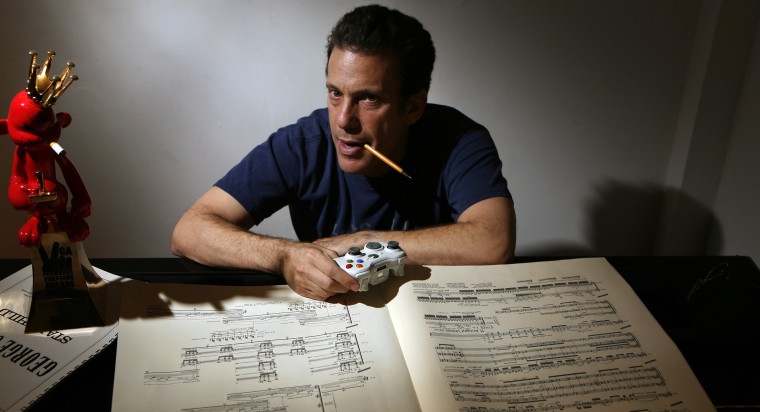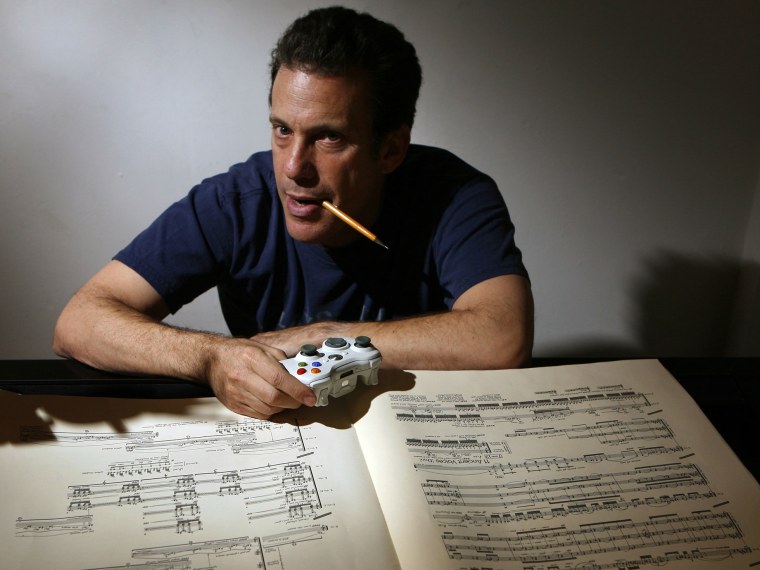
"BioShock" has always won praise for its atmospheric storytelling more so than the moment-to-moment gameplay of shooting bad guys, however as fantastic as shooting those bad guys with a swarm of birds or lightning bolts may be. And for a genre overflowing with Skrillex-like bass-drops and soaring orchestral set-pieces, "BioShock Infinite" once again stood out from its peers for the way it used what Garry Schyman, the series' long-time soundtrack composer, calls "small forces."
Despite winning near-universal critical acclaim for his work on "BioShock," Schyman, like pretty much everybody else involved in "Infinite's" storied development process, took a lot of twists and turns to get to a point where he was happy with his work. NBC News caught up with Shyman recently to talk about his work with the acclaimed first-person shooter franchise.
"BioShock" has always combined historical authenticity with magical realism. "Infinite's" story literally leaps around space and time, for instance. Did you draw from a specific era of music for your inspiration for the soundtrack? Or with all the fantastical and historical elements at play, what was the main mood or setting that you wanted to establish?
Well there are several different aspects to the game. There's the combat music, which was not trying to draw from an era. It was trying to find a unique and interesting way to drive the combat within the orchestration I developed early on, which was to use these small string ensembles—almost quartet sized, sometimes as large as ten players, but never orchestral. You'd normally think of combat as having big orchestral effects.
Columbia is this American city that's gone off on its own. The early twentieth century American experience, late nineteenth century, was definitely part of the approach to its music—though only for a few cues, like "Lighter than Air," which has a sort of Steven Foster element to it. But in general, the music from that era was not all that interesting from a scoring point of view. The classical music was European; it didn't feel American to me. The songs from that era weren't that evocative. It really was coming up with something that had its own unique style that suggested that era with simple string arrangements very often.
You'd think there would be a temptation to make everything seem as grandiose and epic as possible. But most of the score gave it this very small, intimate feeling. Was that to emphasize the closeness of Booker and Elizabeth's relationship, or something else?
I was definitely trying for something different. I didn't want the big orchestral approach, so we said, "Let's let this limitation be the strength." Very often, that can be! Stravinsky is famous for saying: "If you show me the entire keyboard on the piano and say, 'start to write music,' I'm paralyzed. But if you hit two notes, I can start writing immediately." In a sense, I used Stravinski's philosophy there, which I think is generally true of art. If you are always giving yourself an infinite palette, you're paralyzed to what's next. But if you limit yourself, you find strength in that. Once we found that sound, it just felt right! Would it be possible with a big orchestra? Sure, but that wasn't the direction we went.
"Infinite" went through a lot of changes throughout its development. How did work evolved along with the rest of the game?
I wasn't an in-house member of the team, but I definitely saw the game evolve and change, and it affected the way the music unfolded. I literally did not find out until my last week of working on the game how it ended. I had to score that scene, so they finally sent me a video.
It was super, super secret…they would have sent someone over here with a gun to shoot me if I posted that to YouTube! (Laughs) And they would have rightly done so. And I got to see the characters unfold! The male Lutece twin originally had a beard. He lost it in the end. I sort of liked the beard, actually.
That kind of fits with the game's central theme – the Lutece twins talk about all these infinite variations on a similar idea. Maybe there's a parallel universe where "BioShock Infinite" still showed Lutece with a beard.
They actually talk about that?
Yeah. Or I took that to be a large part of the game's ending.
That's really interesting! (Laughs) That's an inside joke, then. That's really funny.
Have you played through the whole game now?
No! I'm scoring a movie right now so my time is at a premium and I'm not able to do it. But it's sitting here on my desk, I'm staring at it right now. It's waiting to get played as soon as I finish in the next week or two. I can't wait to play it. But I couldn't play the game while it was being made because they don't let builds of the game out. Most developers will not do it—they're nervous about something happening in the wild, something getting released, you know. So they would play the game in-house and send me movies of the gameplay. Then I would score that scene, or use that to inspire what I was writing.
Aside from the gameplay, would they send you concept art or pictures to suggest: "This is what the world is going to look like, here are some of the characters?"
That's usually the first thing that you get until the team can start to get you video of gameplay, which is more valuable to me actually. The others are conceptually interesting, but it would be like scoring a scene from a movie using just stills—somewhat useful, but not really in the end.
Many game writers I've spoken to often emphasize that they feel writers need to closer to the rest of the development team than they have been in the past. Do you feel the same way, or do you see any similarity between the way narrative is created for games and the way music is?
It would have been insane for me to do that, plus it would have cost [Irrational] a lot of money. I wouldn't have been able to do anything else for three years. If you took all the days I was working it probably would be six months, you know? So it would have been a lot of wasted time. Though it would have been ideal if I lived in the same city and could go down there once a week.
So yeah: I think there are advantages to working in-house, but I don't think it precludes you from doing an effective score. Sometimes the developer doesn't have that option if they want to get a certain talent to be involved. If they don't live in the same city, they either find someone else who may be a lesser talent. Or they just suffer with that handicap.
